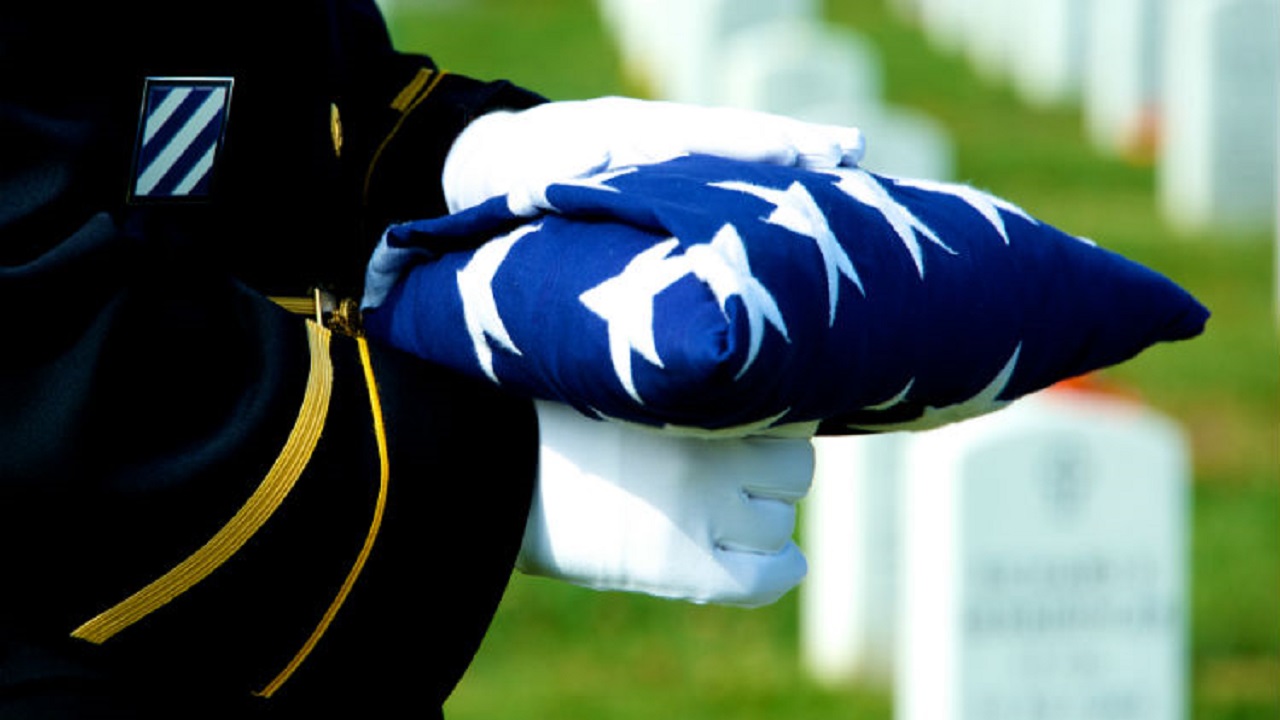Most veterans are eligible to receive burial benefits through the U.S. Department of Veterans Affairs (VA) and the Department of Defense (DOD). This VA burial benefits fact sheet will help you and your family understand what burial costs are covered, what services and products are available, the eligibility requirements for burial benefits, and how to apply for them.
VA Burial Benefits Fact Sheet
Fact 1: VA Benefits Do Not Cover All Funeral or Cremation Costs
Burial benefits provided by the VA come in several different forms. Veterans and their surviving families may be eligible for monetary benefits, honorary recognitions, and specific funeral goods and/or services. However, it’s important to understand that all these benefits combined still may not cover the total cost of a veteran’s final arrangements.
Fact 2: Documentation Is Needed to Verify a Veteran’s Military Service
A copy of a veteran’s “Report of Separation” documents, also known informally as “discharge papers,” is required to verify military service and determine eligibility for most VA benefits. The majority of veterans who served after 1949 received DD Form 214 to document the details of their service.
For those families and veterans who do not have discharge papers, they can be requested from the National Personnel Records Center of the U.S. National Archives and Records Administration online, by mail and by fax.
Fact 3: A Veteran’s Next of Kin Must Request a Burial Flag
A United States flag is provided at no cost to drape the casket or accompany the urn of an eligible veteran. Generally, the flag is given to the next of kin, and only one flag may be provided per deceased veteran. An “Application for United States Flag for Burial Purposes” (VA Form 27-2008) must be submitted along with a copy of the veteran’s discharge papers. Flags may be obtained from VA regional offices and most U.S. Post Offices. The funeral home handling a veteran’s affairs should also be able to assist with obtaining a flag. However, burial flags are typically provided at burial ceremonies in national, state and military post cemeteries.
Fact 4: Military Funeral Honors Ceremonies Must Be Scheduled in Advance
The law requires that every eligible veteran receive a military funeral honors ceremony upon the family’s request. This ceremony includes a detail of at least two uniformed military personnel, the playing of “Taps,” and folding and presentation of the burial flag to the next of kin. However, this demonstration of gratitude must be requested.
The Department of Defense manages this program, which is called “Honoring Those Who Served.” Funeral directors can help families request and arrange military funeral honors for veterans, and many funeral providers work with various veterans organizations to assist in the provision of these ceremonies. For veterans who are eligible for burial in a VA national cemetery, cemetery staff may also be able to handle these arrangements.
Fact 5: Veterans’ Caskets Are Not Free
Neither the VA nor the individual branches of the military provide free caskets for deceased veterans unless death occurs while they are on active duty. Goods and services purchased from funeral homes or cremation providers are not covered by the VA and must be paid for privately. However, some funeral homes offer caskets and other funeral goods and services at discounted prices to members of veterans organizations like the American Legion and Veterans of Foreign Wars (VFW).
Fact 6: Presidential Memorial Certificates Must Be Requested
Initiated in March 1962 by President John F. Kennedy, the Presidential Memorial Certificate program provides an engraved paper certificate to honor the memory of honorably discharged deceased veterans. Certificates are signed by the current president.
Starting in 2020, one certificate will be automatically presented to a veteran’s next of kin if the veteran is interred in a national cemetery. Certificates for eligible veterans who are buried in private cemeteries and additional certificates are available to family members and close friends by request.
Certificates can be requested by filling out VA Form 40-0247 and sending it along with copies of the veteran’s discharge documentation and death certificate to the address on the form.
Fact 7: Burial Allowances Are Available to Reimburse Surviving Family for Funeral Costs
A veteran’s surviving family may be eligible to receive a monetary benefit to help cover funeral, burial and transportation costs that will not be reimbursed by other organizations. Upon notification of a veteran’s death, eligible surviving spouses of record should receive automatic payment of burial allowances from the VA. In cases where there is no surviving spouse, the death benefit may be paid to a veteran’s partner from a legal union, child, parent, or executor/administrator of their estate, but a claim must be filed to request the funds.
In addition to the burial allowance, surviving family may also be approved for a plot allowance and/or reimbursement for costs associated with transporting the veteran’s remains. For example, in the event of a non-service-connected death, a burial and funeral expense allowance (up to $828) and a plot-interment allowance (up to $828) may be awarded, depending on the circumstances. To receive a VA burial allowance, the late veteran must have been discharged under conditions other than dishonorable and meet at least one of the following criteria:
- The veteran died because of a service-related disability.
- The veteran was receiving VA pension or compensation.
- The veteran was entitled to receive VA pension or compensation but decided to receive his or her full military retirement or disability pay.
- The veteran died while receiving care in a VA facility or a non-VA facility under VA contract.
- The veteran died while traveling under authorization and at VA expense to or from a specified place for examination, treatment or care.
- The veteran had an original or reopened claim for VA compensation or pension pending at the time of death and would have been entitled to benefits from a date prior to the date of death.
For non-service-connected deaths, an “Application for Burial Benefits” (VA Form 21P-530) must be submitted within two years of the date of the veteran’s burial or cremation.
Fact 8: There Are Eligibility Requirements for Burial in VA National Cemeteries
Veterans who have met active duty service requirements and were discharged under conditions other than dishonorable are entitled to burial in a VA national cemetery. Under certain conditions, the surviving spouse and children of an eligible veteran are also entitled to this benefit.
Burial in a VA national cemetery includes the following benefits at no cost to the veteran’s family:
- An assigned gravesite (if space is available)
- Opening and closing of the grave
- A government-furnished grave liner (if necessary)
- A government-furnished upright headstone, flat marker or niche cover
- A burial flag
- Perpetual care of the grave
Cremated remains are buried or interred in VA national cemeteries in the same manner and with the same honors as casketed remains.
It is important to note that you may not reserve space in a VA national cemetery ahead of time, since these cemeteries only allow arrangements to be made at the time of death. Additionally, there are often waiting periods before burials can occur, especially if the surviving family does not have proper documentation and the VA must verify the decedent’s eligibility. Families can facilitate this process by obtaining pre-need burial eligibility confirmations for all individuals who may qualify (e.g., veterans, spouses, dependent children).
Read: Funeral Pre-Planning for Veterans
Fact 9: Memorial Items for Use in Private Cemeteries Must Be Requested
The VA, upon request and at no charge to the applicant, will furnish an upright headstone or flat marker for the grave of any deceased eligible veteran in any cemetery around the world. Upright headstones are available in granite and marble, and flat markers are available in granite, marble and bronze. Bronze niche markers for cremated remains are also available. Keep in mind that memorial items must typically be consistent with existing monuments or markers at the veteran’s place of burial.
An “Application for Standard Government Headstone or Marker for Installation in a Private or State Veteran’s Cemetery” (VA Form 40-1330) must be submitted.
Government medallions are also available for affixing to privately purchased headstones or markers for eligible veterans who are interred in private cemeteries. A veteran may not receive both a medallion AND a government-furnished headstone, marker or niche cover.
A “Claim for Government Medallion for Placement in a Private Cemetery” (VA Form 40-1330M) must be submitted.
Fact 10: Replacement Military Service Medals, Awards and Decorations Must Be Requested
Over the years, it is easy for military service medals, awards and decorations to get misplaced. Replacements must be requested from individual branches of the military, but the National Personnel Records Center (NPRC) can help verify cases involving Air Force veterans and Army veterans. Family members may request medals and awards for living veterans only if they have obtained the veteran’s signed authorization. For deceased veterans, requests are accepted from the next of kin.
Requests can be made online using the eVetRecs website or by submitting Standard Form 180 (SF 180) along with a copy of the veteran’s discharge papers. Generally, there is no charge for medal or award replacements. For more information and the mailing addresses of the military branch offices to submit requests, call 1-86-NARA-NARA (1-866-272-6272) or visit the NPRC website.

